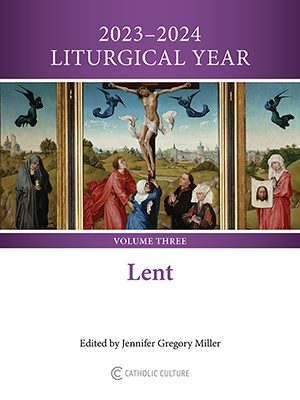Why can't women be priests?
By Diogenes ( articles ) | Jul 22, 2005
Free eBook:

|
| Free eBook: Liturgical Year 2023-2024, Vol. 3 |
When a puzzled Jewish academic asks me, "Why doesn't the Catholic Church ordain women?" I can give him a pretty satisfactory answer -- satisfying, that is, to the historical curiosity behind his question. It's largely a matter of laying out the nature of decision-making authority in the Church, reviewing the relevant tradition, and giving a synopsis of the authoritative decisions made. Within the terms of authority as that authority understands itself, the answer to his question doesn't admit of much doubt.
But very often today another question is asked: "Why can't women be priests?" And almost always the person who poses the question in those terms wants a different kind of answer than that which satisfied our Jewish professor. As the words "can't be" indicate, this questioner is usually asking for a deductive proof; he wants an explanation why -- given what we believe about the nature of the Trinity and the nature of women -- the doctrine on Holy Orders could not be otherwise than it is. In effect, he's making this demand: "Prove to me that God could not have included a female priesthood in His plan of redemption without acting contrary to His divine nature."
This challenge is perhaps impossible to answer, and as far as I know hasn't been seriously attempted. Most educated Catholics, including I think the greater number of bishops and priests, are keenly aware of this limitation. Since no deductive proof can be offered in response to the question "Why can't women be priests?" they tend to the belief that there is no valid theological argument at all for excluding women from Holy Orders, and consequently think that, sooner or later, shifts in cultural attitudes combined with new urgency of pastoral needs will bring about a change in the teaching.
But many solemnly defined doctrines are equally "vulnerable." Suppose we ask, "Why can't rye bread become the Body of Christ?" Is there a deductive proof that will satisfy the questioner? Is the nature of God such that, of all the cereal grains, wheat and only wheat could provide the matter of the sacrament? Such that rye by its nature as rye is ontologically unsuitable? Such that eucharistic doctrine could not be otherwise without an offense against reason or Trinitarian dogma?
Of course not. You can't put a pistol to the head of the Church and demand a deductive proof for the exclusive validity of wheat. The Church can only answer 1) that her use of wheat is fitting (it is appropriate in itself and doesn't contradict Scripture or other doctrines); 2) that it is consonant with her tradition (we know it has been used in the past and have no reason to believe the orthodox have used anything else); and 3) that every time a doubt has been raised, she has given the same answer. It's a humbler kind of suasion than a deductive proof, it doesn't silence personal doubt with the finality that a syllogism does, but the nature of the wheat-versus-rye question is such that no other kind of considerations could be tendered in reply.
Now when you examine the arguments that the Church proposes for restricting the priesthood to men -- laid out in Inter insigniores by Paul VI and reaffirmed by John Paul II in Ordinatio sacerdotalis -- you see they're of the "wheat-not-rye" variety:
"[The Church] holds that it is not admissible to ordain women to the priesthood, for very fundamental reasons. These reasons include: the example recorded in the Sacred Scriptures of Christ choosing his Apostles only from among men; the constant practice of the Church, which has imitated Christ in choosing only men; and her living teaching authority which has consistently held that the exclusion of women from the priesthood is in accordance with God's plan for his Church."
Deductively conclusive? No, but it doesn't pretend to be. It's congruent with, but not dictated by, ordinary human reason and the biblical data. You have to trust the Church is preserving God's sovereign freedom here as you have to trust her in the case of eucharistic matter. Once you suspect she's lying, or hiding a deeper truth that you (or your coterie) can recover, you step out into the Void.
A final word. I mentioned above that many churchmen, impressed by the lack of proof for the traditional doctrine, believe the Church will eventually bow to necessity and change her practice. Of course they're also aware of the feebleness of the culturally conditioned prudential considerations that individual clerics -- not infrequently they themselves at an earlier stage of enlightenment -- offered against women priests ("Women can't be priests because they don't know Latin. Women can't be priests because they can't keep a secret," etc). Often, by a kind of occult compensation, such men erroneously attribute these prejudices to the teaching Church, and then reproach her for irrationalities that she never indulged, though many of her ministers did.
When it comes to doctrine, then, you can either take the Church as a loving teacher, or you can take her as an opponent and reckon her defeated wherever and whenever she doesn't pin your shoulders to the mat. The injustice and unloveliness of her ministers often make the latter the more attractive option, but to those who mistrust her she has no gift to offer at all. None.
All comments are moderated. To lighten our editing burden, only current donors are allowed to Sound Off. If you are a current donor, log in to see the comment form; otherwise please support our work, and Sound Off!







